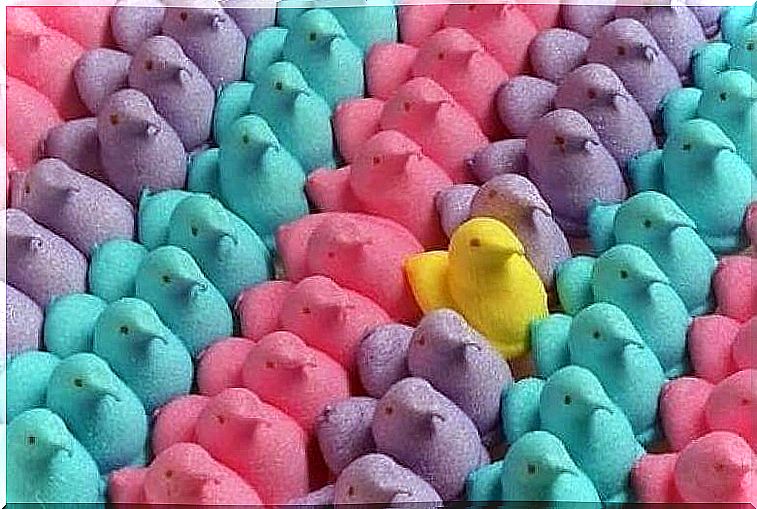Do You Know Why Obsessive-compulsive Disorder Is Characterized?

You may have heard a lot lately about the search for the biological components of different mental health problems. From the study of the genes responsible for all existing mental disorders to the brain areas or the neurotransmitters involved. But given the complexity of the human being, biology cannot explain everything and that is why clinical psychology has looked for different psychological markers, which in the case of obsessive-compulsive disorder (OCD), would have a lot of weight in its development.
Therefore, the following article is based on the research carried out by the Spanish Association of Psychopathology and Clinical Psychology on obsessive-compulsive disorder and its psychological markers. Specifically, Gertrudis Forné, M. Ángeles Ruiz-Fernández and Amparo Belloch have found that the feeling of unfinished and “not just right” experiences could be predictors of obsessive-compulsive symptoms.
Based on the results of their research published in the article entitled: “Feeling of unfinished and” not just right “experiences as motivators of obsessive-compulsive symptoms” we are going to treat this disorder. Because as in all mental disorders, not only biology is decisive and this means that for its correct treatment, medicine alone is not enough.
What is obsessive-compulsive disorder like?
To explain the psychological markers of obsessive-compulsive disorder, it is first of all convenient that we know what it is about. Thus, this disorder was previously included in the different diagnostic classifications within anxiety disorders, but the evolution in its knowledge has meant that in the latest update of the Diagnostic and Statistical Manual of Mental Disorders, known as DSM-5, it is give weight as its own entity.

People who suffer from this disorder manifest significant obsessions collected by images, thoughts or recurrent impulses that cause them anxiety; an anxiety that they try to alleviate through repetitive behaviors or mental acts. An example of this would be a person with the obsession that he can get sick because there are many germs in the environment and he washes his hands continuously when he touches something, being able to get them raw from rubbing and washing them so often.
Normally, these compulsive rituals cause discomfort in the subject who performs them and waste a lot of time. In addition, although at some point in his life he has recognized that these obsessions and / or compulsions are excessive and even irrational, he does not see himself able to stop doing them.
Psychological markers and their importance in obsessive-compulsive disorder
From the cognitive-behavioral perspective in psychology, which is the one with the greatest empirical support in the treatment of obsessive-compulsive disorder, the importance of dysfunctional beliefs and the avoidance of harm is often highlighted as the fundamental explanation for the genesis of the disorder . But this explanation was limited in terms of the heterogeneity of dysfunctional beliefs that patients had about their symptoms and the need for compulsions.
Due to this limitation, different researchers around the world began to consider other psychological factors as specific diagnostic features of obsessive-compulsive disorder. Coming to conclude the presence of the feeling of unfinished only in obsessive-compulsive disorder, compared to other anxiety disorders .
The feeling of unfinished refers to a persistent feeling that the task at hand is incomplete. So it is prolonged in time because of the thoroughness with which it takes and occupies most of the person’s thoughts when looking for that which is missing and cannot be found.
In addition, researchers have also suggested that “not just right” experiences would be a central point in this disorder. These experiences are those that make us think that what is being done is not good enough or is not good enough to leave it as it is. So it will lead the person to constantly repeat each of the steps to make sure that they have not forgotten anything and thus try to reach an impossible perfection.
As we can see, different researchers have made sense with these concepts of compulsive repetition and mental obsession; taking a step further to explain the heterogeneity of this disorder.

Results of the investigations of the psychological markers of OCD in the Spanish population
Given these findings, Gertrudis Forné, M. Ángeles Ruiz-Fernández and Amparo Belloch decided to carry out a Spanish investigation on these concepts to try to replicate the results. To do this, they used the following instruments: Not Just Right Expiriences Questionnaire-Revised (NJREQ-R) and the Vancouver Obsessive-Compulsive Inventory (VOCI).
The results obtained tell us that both unfinished experiences and “not just right” feelings occur in the general population, but to a greater extent in the population with obsessive-compulsive disorder. This would indicate that these experiences could be considered as a factor / marker of vulnerability to develop symptoms of this disorder.
They have also found associations between “not just right” experiences and the feeling of unfinished with the tendency to perfectionism and intolerance of uncertainty. This point could help us design a future, more advanced intervention related to this type of thinking for this disorder.
All these results lead us to conclude that we still have a lot to know about obsessive-compulsive disorder. Also, these results show us the importance of psychological factors in the genesis, course and treatment of different mental illnesses.









